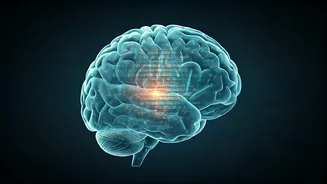Digital Memory Landscape
The advent of digital technology has profoundly reshaped the landscape of human memory. Initially, people primarily relied on their own mental capacity
to retain information. They used mnemonic techniques, repetition, and various memory aids like diaries and journals. However, the advent of the internet, smartphones, and vast digital storage has changed this. We now have instant access to a plethora of information at our fingertips, readily available through search engines, digital documents, and social media archives. This shift has altered our cognitive habits; we depend less on memorization and more on the ability to access and retrieve information quickly. This digital reliance creates a new dynamic where external storage solutions supplement our internal memory systems.
Tech's Impact on Recall
The proliferation of digital tools influences how we recall information. When we know that information is readily available online, we're less inclined to commit it to memory. This is called the 'Google effect' or 'digital amnesia.' Studies indicate that the mere availability of information online changes how our brains prioritize memory storage. Instead of striving to retain facts, we often focus on the where and how to find them. This strategy is efficient in the short term, but it might weaken the neural pathways associated with long-term memory. It's also important to acknowledge that the nature of digital recall is different. Retrieving information from a search engine involves different cognitive processes than recalling it from personal memory. This digital form of recall relies on pattern recognition and keyword association, which influences the way we structure and remember information.
Forgetting in the Digital Age
While digital tools aid in accessing information, they also contribute to how and why we forget. The constant flow of information and the sheer volume of data we encounter daily can lead to 'information overload,' which overwhelms our cognitive abilities. Our brains have limited capacity, and they automatically filter out irrelevant details. When faced with an inundation of data, we may struggle to differentiate between essential and non-essential information, resulting in quicker forgetting. Digital technologies also create unique challenges in forgetting. The permanence of digital records, from social media posts to emails, contrasts our natural tendency to forget as a protective mechanism. It becomes harder to move on or create a new mental space when old information constantly resurfaces. This permanence demands a conscious awareness of digital footprints and a more mindful approach to managing our digital data.
Cognitive Consequences Examined
The shift in how we remember and forget information due to digital tools has noteworthy cognitive consequences. Some research suggests that relying heavily on technology can weaken our working memory and reduce our ability to concentrate. Over time, these habits might affect our capacity for critical thinking and problem-solving. However, the influence of digital technology on cognition is complex and controversial. Some experts argue that digital tools enhance our cognitive function by freeing us from the burden of memorization. This could provide room for creative thought and analysis. By using digital tools, we can also be more efficient, accessing information and making decisions rapidly. Nevertheless, it's necessary to maintain a balanced approach that incorporates both digital and analog methods to enhance our cognitive performance and optimize our cognitive processes.
Memory Management Strategies
To optimize memory function in this technological era, we need intentional strategies. Firstly, we must cultivate a mindful approach to information consumption. Consciously deciding what to retain and how to remember it can help filter unnecessary data and strengthen memory pathways. Implementing mnemonic techniques like association, visualization, and spaced repetition can be invaluable when memorizing new information. Secondly, we should limit screen time and build regular breaks into our daily activities to reduce mental fatigue. Prioritize activities that exercise the brain, such as reading, solving puzzles, and engaging in creative pursuits. Lastly, learn to effectively manage digital information by organizing files, curating online content, and developing mindful digital habits. This helps to improve the balance between relying on technology and utilizing the human brain's natural capabilities.
Future of Human Memory
The future of human memory in the digital world is uncertain, but one thing is certain: technology will continue to play a pivotal role. As AI and other technologies advance, we can expect even more changes in how we store, retrieve, and process information. Potential developments include personalized memory aids and brain-computer interfaces. It is important to approach these technological advancements with a balanced perspective. It's crucial to understand both the benefits and potential downsides of integrating technology with our cognitive processes. The goal is not to eliminate technology from our lives but to use it mindfully. We can optimize memory function and ensure that the human mind stays as sharp as possible in an era of constant innovation. It's all about balancing technological dependence and preserving our ability to remember, think, and grow.













